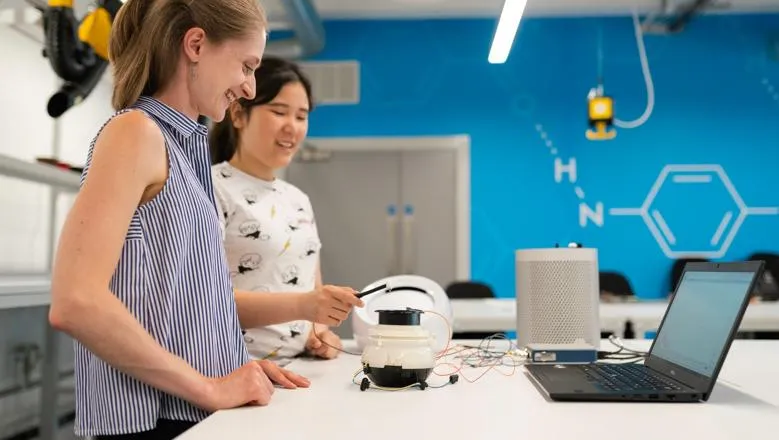
King's Doctoral College
A hub for everyone involved in doctoral research at King’s.
Our internationally renowned department fosters an innovative and intimate research environment. We welcome PhD students from around the world working on a broad range of topics.
This PhD sits within the Statistics Group at King’s, a growing area of research in the Department in response to the increasing importance of data in our world. The group has research strengths in the design and analysis of experiments, time series, Markov chain Monte Carlo and sequential Monte Carlo methods.
We have a wide range of research opportunities, from Design of experiments, Functional Analysis, and Computational Methods to Time Series Analysis, Bayesian and Nonparametric Methods.
You can explore and identify research topics and academic staff in your area of interest.
Scholarships
King’s is a partner of the Martingale Foundation, which awards fully funded Scholarships for postgraduate degrees in mathematical sciences at research universities in the UK.
Tuition fees and research expenses are fully covered, and Scholars receive a tax-free living wage stipend. Martingale Scholars also receive access to leadership and career development through a multi-year programme of training and support.
Partner organisations
We have strong links with industry such as Janssen Pharmaceuticals and Jupiter Asset Management, government through the Centre for Urban Science and Progress (CUSP) London, and other academic institutions such as our training sessions with University College London, four per year on topics including Github code sharing, collaborative research (working with industry) and how to write a paper for a statistical journal.
UK Tuition Fees (2024/25)
Full time: £6,936 per year
Part time: £3,468 per year
International Tuition Fees (2024/25)
Full time: £26,070 per year
Part time: £13,035 per year
UK Tuition Fees (2025/26)
Full time: £7,500 per year
Part time: £3,750 per year
International Tuition Fees (2025/26)
Full time: £28,000 per year
Part time: £14,000 per year
These tuition fees may be subject to additional increases in subsequent years of study, in line with King's terms and conditions. Bench fees will be applicable to the non-award research programme for visiting students.

Located on the north bank of the River Thames, the Strand Campus houses King's College London's arts and sciences faculties.
Our research groups organise regular seminars, where top-ranking scientists from around the world present new results. And students themselves organise informal seminars and discussion groups to share their expertise and latest findings. The department provides funding for PhD students to attend suitable schools and conferences during their studies.
You will be assigned a supervisor with whom you will work closely. You will also attend research seminars and take part in other research related activities in your research group, the Department and more widely in the University of London. You will be provided with access to working and storage space, as well as a laptop.
We participate in the London Graduate School in Mathematical Finance, a consortium of the mathematical finance groups of Birkbeck, Brunel, Cass Business School, Imperial, King's, LSE and UCL. It provides a programme of advanced courses in mathematical finance. We also participate in the London Taught Course Centre which offers advanced courses for PhD students in mathematics, including several courses that are relevant for research in analysis and statistics.
Postgraduate training
Department and College induction events are scheduled at the beginning of your degree to prepare you for life as a PhD student. All students are required to complete 10 days of training each year.
Our PhD students receive various forms of training during their period of research, e.g. attending courses in the London Taught Courses Centre, attendance at EPSRC summer schools; provision of advanced lecture courses; College training courses for graduates who will give tutorial teaching to undergraduates; weekly seminars in the area of your research; frequent research group meetings; attendance at national and international conferences and research meetings. Communication skills are developed by preparing and presenting seminars in the department, assisted by your supervisor.
There is a centrally provided programme of training coordinated by the King's Doctoral College and the NMES Graduate school offers a range of unique training for our students with a focus to support PhD research and the PhD journey. The NMES Graduate School organises a variety of social and research events for students from hosting the NMES PGR Welcome event, Science walking tours, Winter and Summer social parties, Movie and board game nights, to Presentation and Writing coffee mornings, a space for students to present their research work to peers and receive feedback. One of the highlights in the NMES PGR calendar is the Research Competition, where 3rd year students across all five departments present their research in a 3-minute video, culminating in an in-person event where all finalist videos are viewed, and the winners receive their prize.
Research students are encouraged to submit papers to conferences and supported with travel to present papers and posters.
Our research students are also encouraged to teach alongside their studies to help prepare them for a potential future career in academia.

The group has research strengths in the design and analysis of experiments, time series and Markov chain Monte Carlo and sequential Monte Carlo methods.

The Probability group in the Department of Mathematics at King's College London.
UK Tuition Fees (2024/25)
Full time: £6,936 per year
Part time: £3,468 per year
International Tuition Fees (2024/25)
Full time: £26,070 per year
Part time: £13,035 per year
UK Tuition Fees (2025/26)
Full time: £7,500 per year
Part time: £3,750 per year
International Tuition Fees (2025/26)
Full time: £28,000 per year
Part time: £14,000 per year
These tuition fees may be subject to additional increases in subsequent years of study, in line with King's terms and conditions. Bench fees will be applicable to the non-award research programme for visiting students.

Located on the north bank of the River Thames, the Strand Campus houses King's College London's arts and sciences faculties.
Our research groups organise regular seminars, where top-ranking scientists from around the world present new results. And students themselves organise informal seminars and discussion groups to share their expertise and latest findings. The department provides funding for PhD students to attend suitable schools and conferences during their studies.
You will be assigned a supervisor with whom you will work closely. You will also attend research seminars and take part in other research related activities in your research group, the Department and more widely in the University of London. You will be provided with access to working and storage space, as well as a laptop.
We participate in the London Graduate School in Mathematical Finance, a consortium of the mathematical finance groups of Birkbeck, Brunel, Cass Business School, Imperial, King's, LSE and UCL. It provides a programme of advanced courses in mathematical finance. We also participate in the London Taught Course Centre which offers advanced courses for PhD students in mathematics, including several courses that are relevant for research in analysis and statistics.
Postgraduate training
Department and College induction events are scheduled at the beginning of your degree to prepare you for life as a PhD student. All students are required to complete 10 days of training each year.
Our PhD students receive various forms of training during their period of research, e.g. attending courses in the London Taught Courses Centre, attendance at EPSRC summer schools; provision of advanced lecture courses; College training courses for graduates who will give tutorial teaching to undergraduates; weekly seminars in the area of your research; frequent research group meetings; attendance at national and international conferences and research meetings. Communication skills are developed by preparing and presenting seminars in the department, assisted by your supervisor.
There is a centrally provided programme of training coordinated by the King's Doctoral College and the NMES Graduate school offers a range of unique training for our students with a focus to support PhD research and the PhD journey. The NMES Graduate School organises a variety of social and research events for students from hosting the NMES PGR Welcome event, Science walking tours, Winter and Summer social parties, Movie and board game nights, to Presentation and Writing coffee mornings, a space for students to present their research work to peers and receive feedback. One of the highlights in the NMES PGR calendar is the Research Competition, where 3rd year students across all five departments present their research in a 3-minute video, culminating in an in-person event where all finalist videos are viewed, and the winners receive their prize.
Research students are encouraged to submit papers to conferences and supported with travel to present papers and posters.
Our research students are also encouraged to teach alongside their studies to help prepare them for a potential future career in academia.

The group has research strengths in the design and analysis of experiments, time series and Markov chain Monte Carlo and sequential Monte Carlo methods.

The Probability group in the Department of Mathematics at King's College London.

A hub for everyone involved in doctoral research at King’s.

A supportive and engaging environment for PhD students.

King's Doctoral College helps secure funding for aspiring researchers.